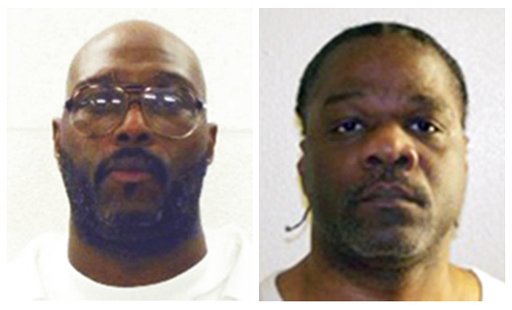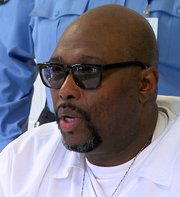Arkansas plans to put to death two men Thursday who have claimed their innocence, presenting another set of legal challenges to state attorneys who failed Monday to clear the way for an earlier round of executions.
Stacey Johnson and Ledell Lee -- who are set to die a little more than an hour apart Thursday evening -- have had their separate murder convictions upheld all the way to the state Supreme Court.
Of the eight men originally scheduled to die as part of a series of April executions, Johnson and Lee are the only two who maintain that they did not commit the crimes that sent them to death row.
Now, with a crush of national and foreign media focused on the Arkansas prisoners and their impending death sentences, two legal nonprofits, the Innocence Project and the American Civil Liberties Union, are lending support to local attorneys representing Johnson and Lee.

EXECUTIONS: In-depth look at 4 men put to death in April + 3 others whose executions were stayed
Click here for larger versions
A late bid by Lee, 51, to get court-ordered DNA testing on a sneaker and a hair strand that he believes would prove his innocence was rejected Tuesday by Pulaski County Circuit Judge Herb Wright because Lee took too long to ask for the test after refraining from such a request for almost 12 years.
Shortly after Wright handed down his ruling, the Innocence Project announced it would appoint an attorney to help Lee appeal to the Arkansas Supreme Court. Earlier, the ACLU announced it had assigned an attorney to represent Lee in federal court. Lee's attorney in Little Rock is Lee Short.
Before joining Lee's case, the Innocence Project assigned two lawyers to help Johnson file a similar petition in Sevier County Circuit Court seeking DNA testing on evidence from the scene, including hair, a green shirt stained with the victim's blood and samples from a rape kit.
Johnson, 47, has repeatedly sought to have evidence run through more modern DNA tests after previous results linked him to the crime. A motion filed with the court states the Innocence Project would pay for new DNA tests on evidence turned over in Johnson's case.
Circuit Judge Charles Yeargan denied Johnson's request Tuesday. It is also being appealed to the state Supreme Court.
After years of appeals and delays, state attorneys say, any relevant evidence in the inmates' cases has already been relentlessly scrutinized to no avail.
"The inmates are guilty beyond any scrap or scintilla of a doubt," Deputy Solicitor General Nicholas Bronni told a federal judge earlier this month.
Earlier this week, two other inmates, Don Davis and Bruce Earl Ward, avoided execution after their attorneys successfully petitioned Arkansas' justices to grant stays while they await a U.S. Supreme Court decision in an Alabama case that addresses the rights of poor defendants to receive their own mental examinations.
Davis has an IQ bordering intellectual disability, and Ward has schizophrenic delusions that prevent him from comprehending his own death, according to court filings. Attorneys have argued that U.S. Supreme Court decisions against the execution of the mentally impaired should prevent the deaths of the men.
The stays placed by the Arkansas Supreme Court do not affect Johnson or Lee, who as of Tuesday had no legal rulings preventing their executions.
"They shouldn't be executing someone if there's doubt on the person's guilt," said Jeff Rosenzweig, a Little Rock attorney who has represented Johnson for more than 16 years.
Johnson was convicted of strangling Carol Heath in her De Queen apartment while her two children hid in April 1993. The oldest child, then-6-year-old Ashley Heath, identified Johnson as the killer.
Police arrested Johnson on his way home to New Mexico, though his first conviction a year later was thrown out in 1996 because a police officer was allowed to testify that Ashley Heath picked Johnson out of a lineup.
Johnson was re-tried and convicted in 2000, this time with testimony directly from Ashley Heath, though his attorneys have argued she was found incompetent to testify in therapist's records that were sealed at the time.
In a public letter delivered to the Parole Board earlier this year, Ashley Heath denied such claims.
At his appearance before the Parole Board in March, Johnson said he did not know Carol Heath. The Innocence Project statement suggests an alternate killer -- an ex-boyfriend of Heath's with a history of abuse.
"This is not some sort of last-minute, hail Mary pass. Johnson asked for DNA testing in earlier appeals, but those requests were denied by State and federal courts," Innocence Project attorney Bryce Benjet said in a release. "DNA testing that identified another male offender on evidence central to the commission of this crime would be definitive evidence that Mr. Johnson is innocent."
The Innocence Project, founded in 1992, has used DNA evidence to exonerate 182 people from prison, said spokesman Paul Cates, but it has not had a successful case in Arkansas.
The group has aided in the representation of men freed from death row in several states, including Oklahoma, Mississippi and Louisiana, according to its website.
Holly Lodge Meyer, the prosecuting attorney who tried Lee's capital case for the 1993 slaying of 26-year-old Debra Reese in her Jacksonville home, said she was surprised to hear of the involvement of the ACLU and the Innocence Project.
"This is the first I've ever heard of him claiming actual innocence, " Lodge Meyer said. "It's news to me."
The current chief deputy prosecutor in Pulaski County, John Johnson, had similar remarks Tuesday, asking Wright to reject Lee's request because the defendant has skipped numerous opportunities to seek the tests in the 22 years since he was convicted.
"He has waited until the eve of the end of his life to make this claim," Johnson said.
Even if the testing showed what Lee claimed, those results would still not be enough to prove Lee was not the man who killed Reese, the prosecutor said. Police linked him to the killing through three witnesses who put him at either Reese's home or in her neighborhood before she was killed.
The mother of one was killed in her Jacksonville home by an assailant who choked her and bludgeoned her 36 times with a tire tool her husband had given her to protect herself. Lee was arrested within an hour of her murder, shortly after he spent a $100 bill that police said appeared to be one of five her father had recently given her.
The judge agreed with Johnson's assessment of the value of the evidence.
Wright's decision capped a 36-hour process to get Lee out of his death-row cell and back into a Pulaski County Circuit courtroom for the first time in almost 10 years. Short, his attorney, filed the petition Sunday night, with prosecutors submitting their objections Monday afternoon.
Short told the judge that Lee has tried to get the materials tested since he went on trial. He asked the judge to place the blame on the defendant's previous attorneys.
"Mr. Lee has tried to enforce his rights along the way," Short told the judge. "I think any fault is the fault of counsel."
Lee was escorted into the courtroom at the same moment the judge took the bench. Lee was under guard by three sheriff's deputies who stayed within arm's length of him throughout the 64-minute proceeding. Two more deputies stood at the entrance to the courtroom.
Lee was dressed all in white, with his hands cuffed to a leather restraining belt that was connected to the ankle chains he wore. He did not speak during the hearing beyond occasionally whispering to his lawyer. He sat up straight with his hands in his lap, occasionally leaning forward or rocking in the chair, as the lawyers argued.
When the guards took him from the courtroom, he turned to look at his mother, Stella Smith, as he was escorted out.
Metro on 04/19/2017
RELATED ARTICLES
http://www.arkansas…">In court bids for his life, killer strikes out 3 times http://www.arkansas…">Drug firm again seeks court stay


